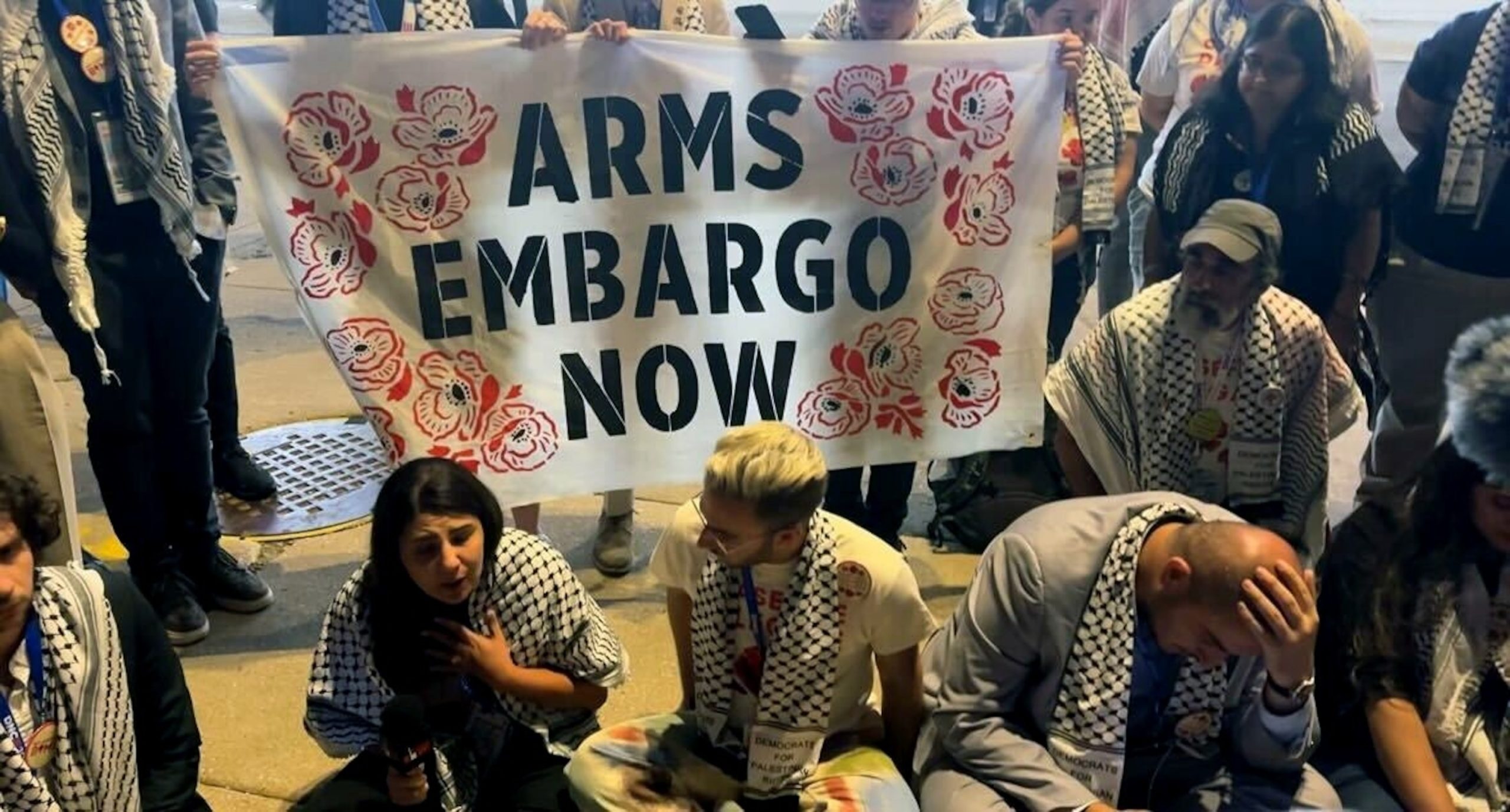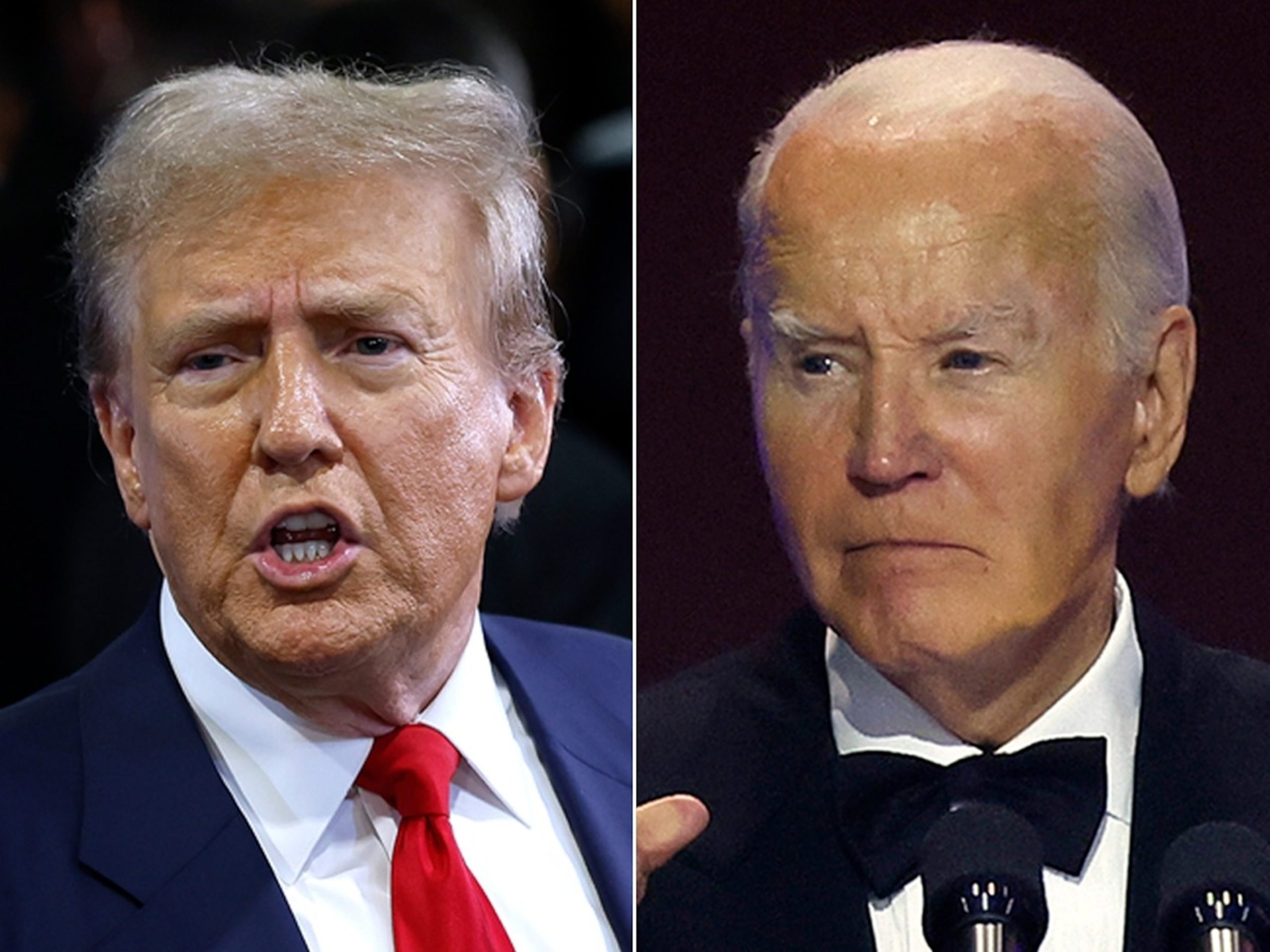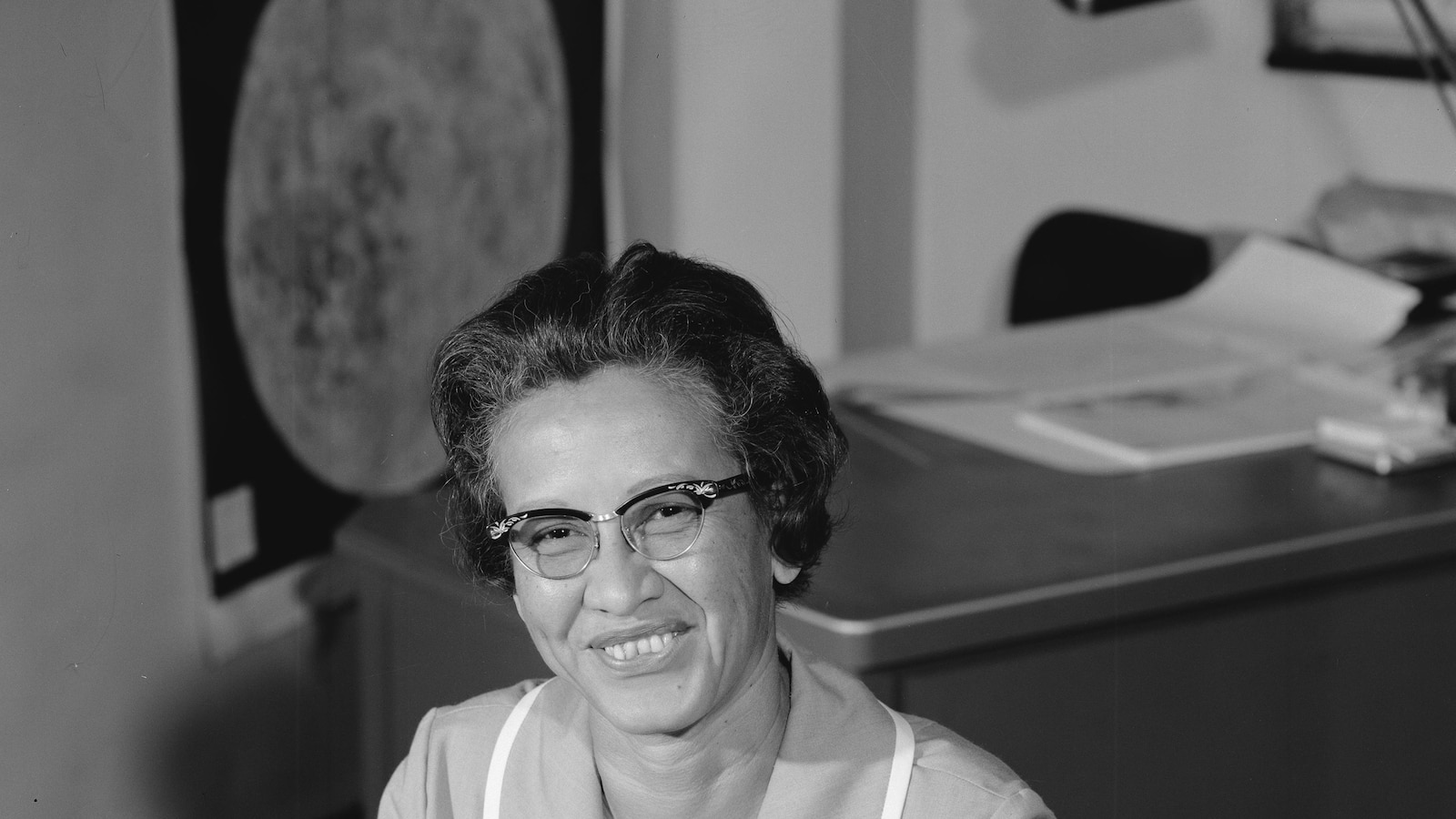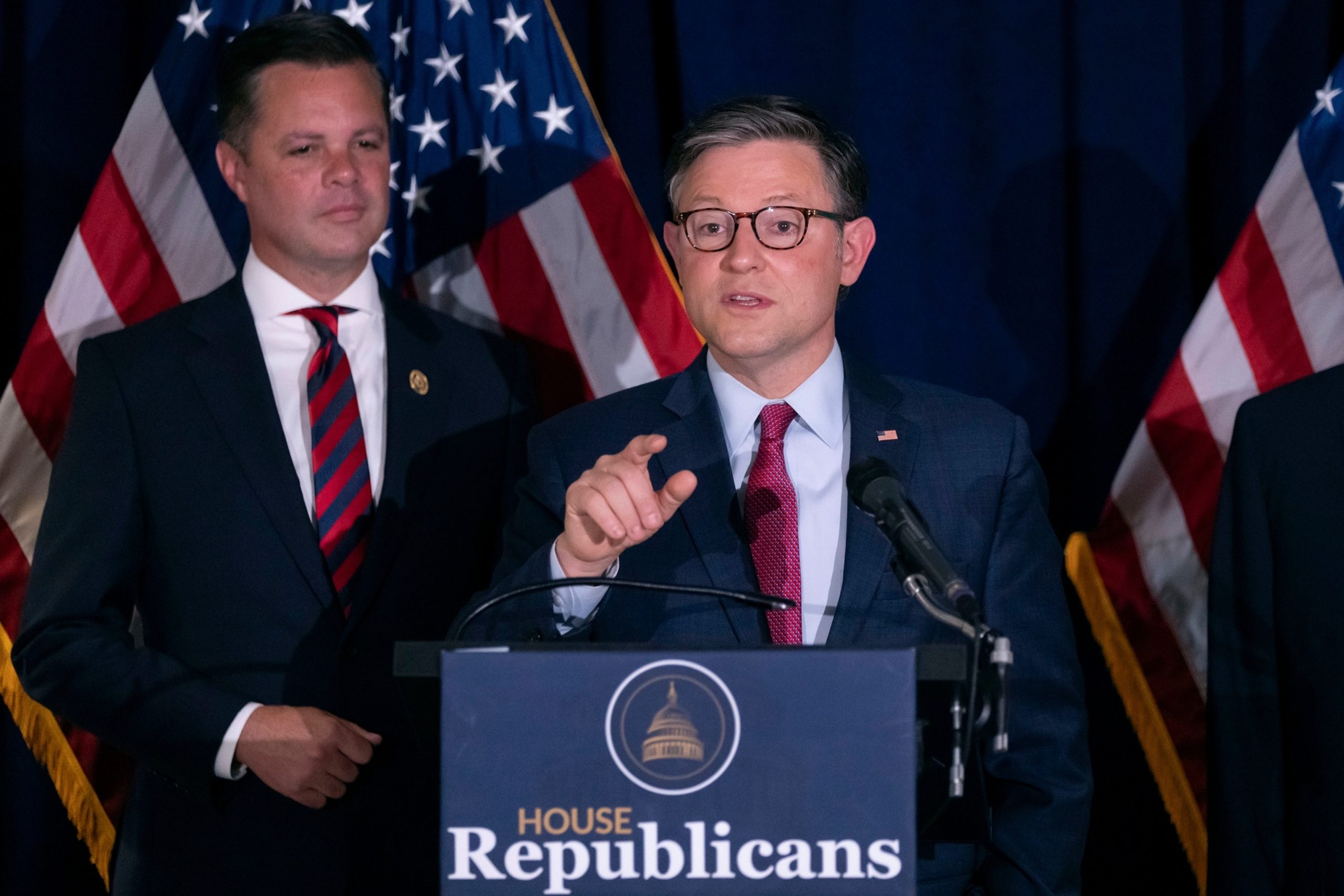Outside the United Center in Chicago, while former President Bill Clinton had taken the stage on the third night of the Democratic National Convention, delegates from the uncommitted movement, whose support of Vice President Kamala Harris is contingent on her support of an arms embargo on Israel, announced to reporters that the DNC had denied their request to have a Palestinian American speaker on the main stage.
“We were hopeful because Vice President Harris’ team has been engaging with us. They’ve been calling, they’ve been having conversations, and we told them what our policy ask is,” delegate Abbas Alawieh told reporters on Wednesday. “I got a call shortly after our press conference earlier, the call said, ‘Abbas, the answer is no.’ I said, ‘What do you mean? We’re just asking for our voices to be heard.'”
The group of about 40 delegates and supporters outside staged a 24-hour “sit in,” telling reporters they would not get up until Harris or someone from her team called them with an answer other than no.
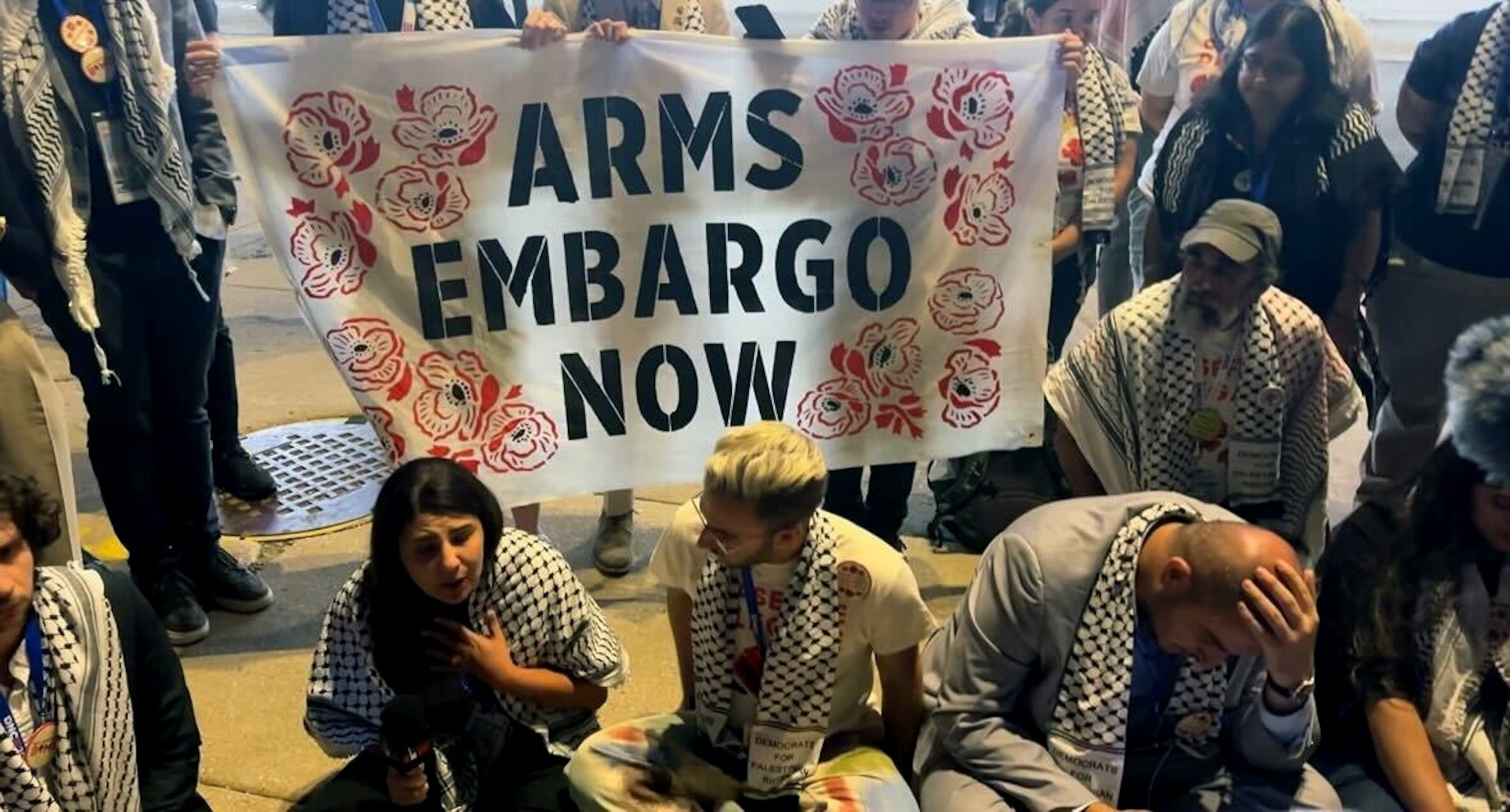
Uncommitted delegates stage “sit in” outside of United Center at DNC in Chicago on Aug. 21, 2024 after being told by the DNC they would not be getting a Palestinian speaker on stage.
Gabriella Abdul-Hakim/ABC News
“We must be heard. This level of suppression is unacceptable,” said Alawieh. “I’m sitting here and I’m not going anywhere, Roger, I’m not going anywhere. You all, you all, you all need to change your mind. I hope you change your mind. Call me if you change your mind.”
Harris campaign Communication Director Michael Tyler responded to ABC News’ Fritz Farrow at Thursday’s morning briefing.
“There’s been a lot of talk about unity this week. So, why won’t you all allow a Palestinian American speaker address the convention?” Tyler was asked. “And simply saying Trump would be worse for Arab Americans—how is that not the campaign taking their votes for granted?”
“No, we’re absolutely not taking their votes for granted,” Tyler answered. “I think, as it relates to uncommitted delegates at this convention, we’re proud, glad that they are here. We’ve worked to engage them throughout the convention. We’re proud of the fact that we held a panel conversations with members of the uncommitted movement,” he said.
“We’re proud that the Vice President herself engaged with leadership in the uncommon movement in Michigan a couple of weeks ago. That’s why the campaign has continued to engage with leadership of the uncommitted movement throughout this convention,” he continued. “What has already been clear that they’ll continue to see progress in this campaign, is a vice president who’s committed to ending the violence, ending the conflict, making sure that we resolve this conflict with a permanent cease-fire that allows Israel to fully secure itself, that fully continues to make sure that we have full humanitarian aid, but also make sure that Gazans are able to peacefully live and prosper in Gaza.”
Democratic Rep. Alexandria Ocasio-Cortez earlier urged the DNC in a post on X to put a Palestinian American speaker on stage.
“Just as we must honor the humanity of hostages, so too must we center the humanity of the 40,000 Palestinians killed under Israeli bombardment,” she wrote. “To deny that story is to participate in the dehumanization of Palestinians. The @DNC must change course and affirm our shared humanity.”
In an emotional moment during the DNC on Wednesday, the parents of Hersh Goldberg-Polin — Jon Polin and Rachel Goldberg — who has been held hostage by Hamas in Gaza since Oct. 7, spoke to the audience about their grief during the past 10 and a half months. More than 1,200 Israelis were killed in the surprise terror attack that day and hundreds taken hostage.
The uncommitted delegates were hoping to have Dr. Tanya Haj-Hassan, a pediatric intensive care physician who had spent time in Gaza working with the nonprofit Doctors Without Borders, also speak on the main stage about what she had experienced.
The DNC gave the movement space to speak at several “panel conversations” at the DNC that weren’t televised but the party refused to meet the uncommitted movement’s larger requests.
“I don’t need to be convinced how dangerous Trump is,” said Alawieh. “We know we can’t be heard in the Republican Party. There isn’t a single Republican federal official who supports a ceasefire even, but we’re Democrats. We’re here. We’re engaging the system.”
The death toll in Gaza has surpassed more than 40,000, according to Gaza’s Hamas-run Health Ministry.
“You can try to suppress us. We’re not going anywhere before November. We’re people who mobilize people. We’re movement people,” Alawieh said. “We’re not going anywhere in four years. We’re not going anywhere in eight years. We’re people who are engaged. You’re not going to get rid of us, and we’re going to engage within the system.”
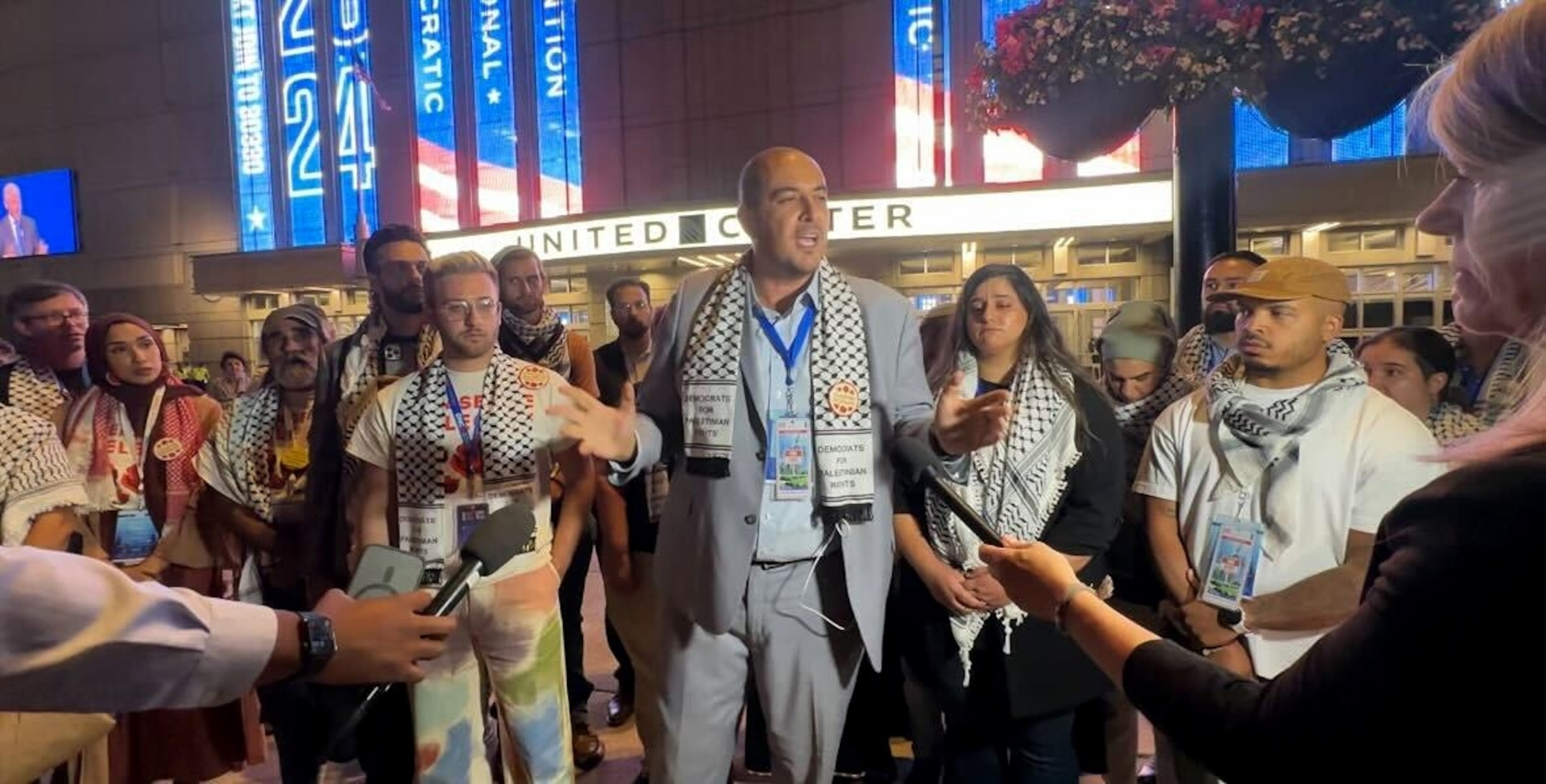
Uncommitted delegates stage “sit in” outside of United Center at DNC in Chicago on Aug. 21, 2024 after being told by the DNC they would not be getting a Palestinian speaker on stage.
Gabriella Abdul-Hakim/ABC News
Harris has noticeably tried to thread the needle on the war in Gaza in an attempt to bridge a major divide in the party over the Israel-Hamas war.
While she has been aligned with Biden in vowing unwavering support for Israel, after meeting with Israeli Prime Minister Benjamin Netanyahu on July 25, she notably said, “Israel has a right to defend itself and how it does so — matters” — specifically with regard to protecting civilians.
The decision by the Harris campaign threatens to put that delicate position in jeopardy. While a Palestinian flag was unfurled inside the convention hall on Monday during President Joe Biden’s remarks, there haven’t been any other significant protests inside the gathering.
The Democratic National Convention (DNC) has come under fire from advocates for excluding a Palestinian American speaker from the convention stage. The decision to exclude the speaker has sparked outrage and criticism from various advocacy groups and individuals who believe that the DNC is silencing the voices of Palestinian Americans.
The controversy began when the DNC announced its list of speakers for the convention, which included a diverse range of voices from different communities. However, one notable absence was that of a Palestinian American speaker, despite the fact that there are many prominent Palestinian Americans who could have been given a platform to share their perspectives and experiences.
Advocates argue that by excluding a Palestinian American speaker, the DNC is sending a message that the voices and concerns of Palestinian Americans are not valued or important. They believe that this decision is part of a larger pattern of marginalization and discrimination against Palestinians in American political discourse.
Many advocates have taken to social media to express their disappointment and frustration with the DNC’s decision. They have called on the DNC to reconsider its decision and to give a platform to Palestinian Americans who have important perspectives to share.
In response to the criticism, the DNC has stated that they are committed to diversity and inclusion, and that they strive to represent a wide range of voices at the convention. However, advocates argue that true diversity and inclusion cannot be achieved if certain voices are systematically excluded.
This controversy highlights the ongoing challenges faced by Palestinian Americans in American society, where their perspectives and experiences are often marginalized or ignored. It also raises important questions about representation and inclusion in political spaces, and the need for all communities to be given a platform to share their stories and advocate for their rights.
As the DNC continues to face criticism for excluding a Palestinian American speaker from the convention stage, advocates are calling for greater awareness and understanding of the issues facing Palestinian Americans, and for their voices to be heard and respected in political discourse. Only by listening to and amplifying the voices of all communities can we truly achieve a more inclusive and just society.
